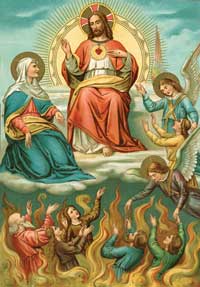October 31st through November 2nd are known to the Catholic Church as the “Hallowed Days” or “Days of the Dead.” During these three days, we recognize those who have gone before us, whether they have been officially declared saints by the Church or not.
First comes October 31st, Halloween. Halloween is shortened from All Hallows’ Evening, or All Hallows’ Eve. Halloween is the eve of Hallowmas, also known as All Hallows’ Day or All Saints’ Day.
Second comes November 1st, All Saints Day. On this day we celebrate all the saints including those unknown to us. This is also a Holy Day of Obligation, meaning that Catholics must attend Mass on this day.
Last comes November 2nd. November 2nd is All Souls Day, the special day set aside to remember and pray for the Holy Souls in Purgatory. A plenary indulgence is granted to those who visit a graveyard and pray for the deceased on this day.
***
More on Halloween:
Many people believe that Halloween is a pagan holiday. But Halloween is the vigil of All Saints Day, and All Saints Day is a purely Catholic holiday. Therefore, Halloween is Catholic and not pagan. Some people say Halloween is pagan because it stems from an ancient satanic pagan celebration, but Halloween has nothing to do with this; Halloween comes from the Church. Nowadays, the secular world puts emphasis on the thoughts of witches, vampires, ghosts, and other scary, evil, and ugly things during Halloween; but all this is just a futile attempt to return to old pagan ways. Just because pagans used to do evil things on October 31st doesn’t mean Christians should stop commemorating All Saints Day. Christians know that old pagan superstitions and fear must give way to the joy of the Resurrection and the reality of eternal life.
Trick-or-treating is also another custom that is often thought to be wrong, but this isn’t true either. Trick-or-treating first started out in the Middle Ages as a Catholic tradition. On All Hallows’ Eve, peasants and their children, who were called “soulers,” would go around the town door-to-door and beg for a “soul cake,” a small, round pancake-type treat. In return for the soul cake, the peasants would promise to pray for the household’s deceased family members to be released from Purgatory. And this is thought to be the origin of trick-or-treating. It began as a Catholic tradition.
***
So in conclusion, the Hallowed Days are both joyful and solemn days to commemorate the saints in Heaven and the souls in Purgatory. During these days, we must not only remember the saints, souls in Purgatory, and deceased, but also remind ourselves of the thought that we must all die one day. We must think of our own personal sins. We must know how to overcome our sins and temptations and know how to make our souls stainless and pure so that we may enter into Heaven with Jesus, Mary, and all of the Saints and Angels at the end of our days.
“The glorious company of the apostles praise Thee.
The goodly fellowship of the prophets praise Thee.
The white-robed army of martyrs praise Thee.
All Thy saints and elect with one voice do acknowledge Thee,
O Blessed Trinity, one God!”
Sources: Catholic Cuisine, Fisheaters
1
You must be logged in to post a comment.